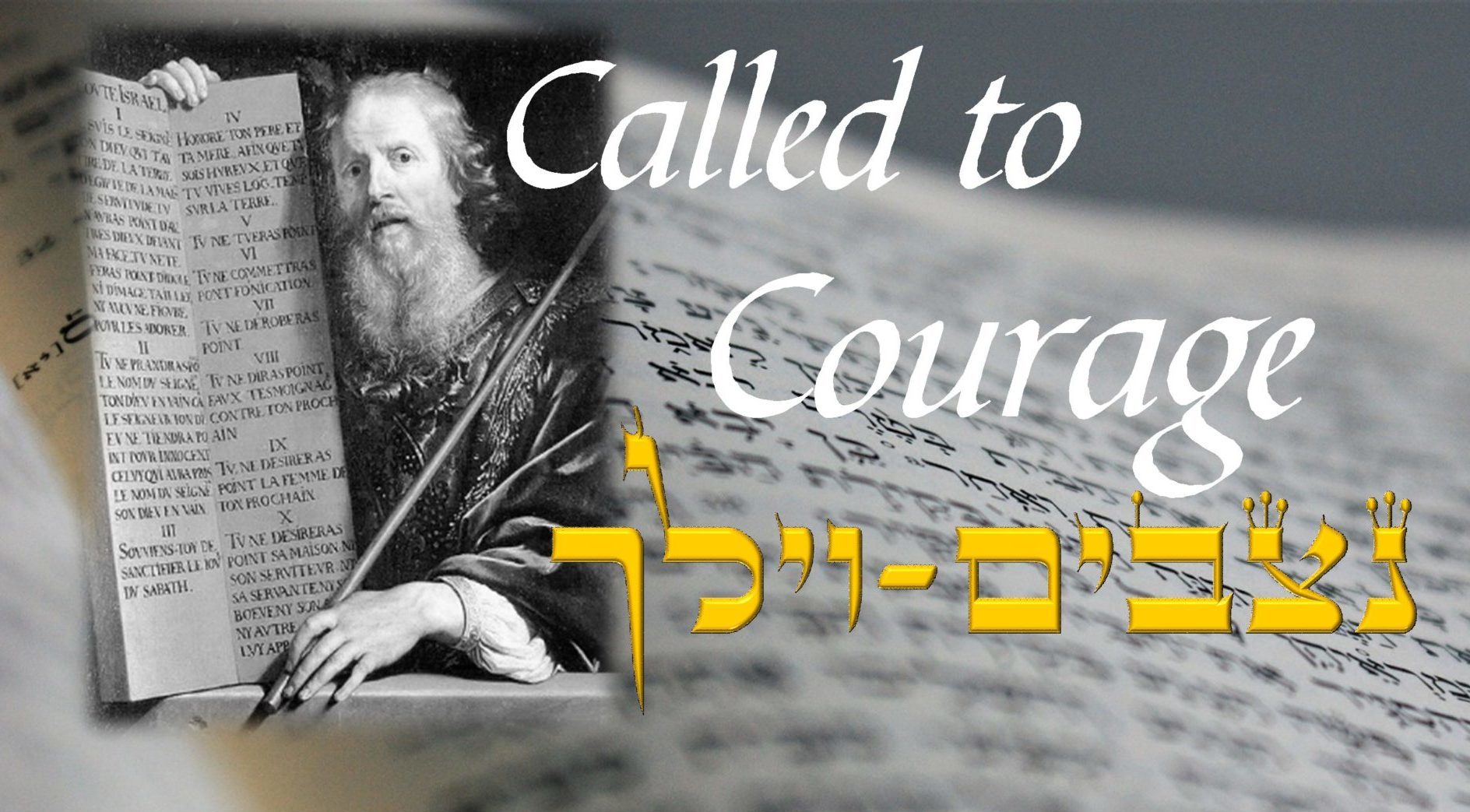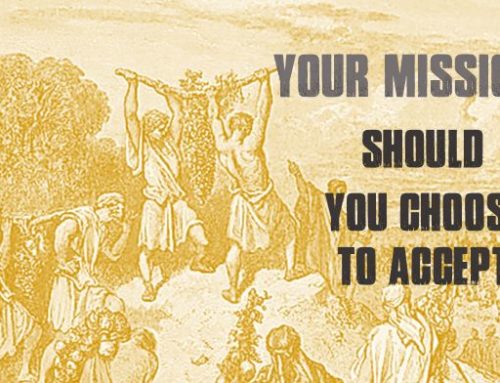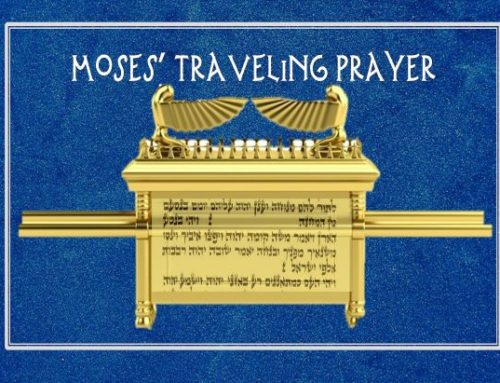Nitsavim-Vayelech
Deuteronomy 29.10-31.30, Isaiah 61.10, Isaiah 55.6-56.8
“Then Moses went and spoke these words to all Israel. And he said to them: “I am one hundred and twenty years old today. I can no longer go out and come in. Also the Lord has said to me, ‘You shall not cross over this Jordan.’” Deut. 31. 1-2 NKJV
This week is a double Torah Portion, Nitsavim and Vayelech. Comprising some seventy verses, they are a study in contrasts. Nitsavim means standing, Vayelech, moving forward. One spoke of Israel’s posture, the other Moses’ progress. In Moab, at the edge of promise, Israel stood before the Lord, before blessings and curses, before life and death. Moses called them to choose life and the length of days through obedience to God’s word.
Over the next few moments, however, I want to focus on Vayelech, “Moses went”. Literally the Hebrew means, “he walked”. Moses faced a circumstance we must all will all face. Moses was in motion but unable to move forward, going but not progressing. The road before Joshua and Israel will not be his. His words lament the condition.
“I can no longer go out and come in. Also the Lord has said to me, ‘You shall not cross over this Jordan.’”
Moses was not hindered by age. At one-hundred and twenty his eyes were not dim, nor his strength diminished. Moses could not go forward because God has blocked his path. What do you do when everything in you says go, but God says, “You shall not pass”? There was no returning to the simple life of a shepherd in Midian, and he could not enter the land of milk and honey across Jordan – blocked and yet unfinished. In these two portions we glimpse a leader handing over his portfolio containing his dreams and destiny. His architectural plans said Moses, but it would be Joshua who would finish the work.
I want to talk to someone who senses God holding you back while He moves forward with another. Listen again to these words to Joshua. “And the Lord has said to me, ‘You (Moses) shall not cross over this Jordan.’ The Lord your God Himself crosses over before you (Joshua).
In just a few short days we will complete this year and enter the Hebrew year 5781. Like Moses, we began the previous year with hopes, but found ourselves unable to come and go. Our strength was not diminished, but the dynamics of the world have changed. Moses speaks to every person unable to move, desperately wanting to finish what they had started. Perhaps you are like me. In this year of the pandemic we have friends no longer with us. Their strength was not diminished, nor were they ready to hand over their portfolio. They loved God, and walked as close to Him as they knew how. Like Moses, unable to cross Jordan, God called them up the mountain, and into the presence and embrace of their Savior. Moses’ words speak to this generation, who is standing in place, yet wanting to go. He implores us to be courageous, to create a lasting testimony, and climb to new heights.
I. He Called the people to Courage
“Be strong and of good courage, do not fear nor be afraid of them; for the Lord your God, He is the One who goes with you. He will not leave you nor forsake you.” Deut. 31.6 NKJV
Three of the seventy verses in these two portions call Joshua “to be strong and of courage”. If there was ever a generation that needed to hear these words, it is this generation. Yeshua, the Messiah warned of perilous times in the last days, but He also called us to lift our heads, to see our Redeemer. Joshua look up to the Lord who is with you in the battle. Friend, look up, and see the Lord fighting for you. And to the last generation look up, the Son of Man is coming on the clouds in great glory!
“And there will be signs in the sun, in the moon, and in the stars; and on the earth distress of nations, with perplexity, the sea and the waves roaring; men’s hearts failing them from fear and the expectation of those things which are coming on the earth, for the powers of the heavens will be shaken. Then they will see the Son of Man coming in a cloud with power and great glory. Now when these things begin to happen, look up and lift up your heads, because your redemption draws near.” Luke 21. 25-28 NKJV
II. He Created a Testimony
“So Moses wrote this law and delivered it to the priests, the sons of Levi, who bore the ark of the covenant of the Lord, and to all the elders of Israel.” Deut. 31.9 NKJV
Moses was compelled to finish the testimony, the written Scriptures. You also have a testimony to leave written in your life’s story. What tangible gift can you pass to the next generation? I did not know much of my father’s people. Many were not godly. I heard from an uncle that one of my grandfathers on my dad’s side had been a Christian evangelist. His testimony stood as a beacon of hope in dad’s family. One day, reading a century old newspapers online, looking for information about Jerusalem, I glanced at an article by a man from my hometown in the States. His words drew me.
“I praise God for the precious blood… “He (God) saved me from sin, I am living in Canaan now…The dear Lord has lead me out in evangelistic work and He has wonderfully used me. I have held two revivals this summer…The Lord confirmed His Word with signs following. Amen. Mark 16.20.”
When I looked to the author’s name, I saw that it was that same grandfather on my dad’s side of the family. We never met in this world, yet he was speaking to me a wonderful testimony! Moses left Israel a testimony of God’s Word. We all may not leave a written story, however. In the New Testament we read of Dorcas. When she died, they brought Peter to the room where her body lay. Before she was raised to life again the widows tangibly showed Peter her testimony woven in love.
“All the widows stood by him weeping, showing the tunics and garments which Dorcas had made while she was with them.” Acts 9.39. NKJV
Dorcas’ labor was not in vain. Those garments demonstrated her faithfulness to care for the widows, as God commanded. Moses’ testimony was a roadmap to a wayward generation who would one day need those words to find their way back to God. What testimony are we leaving to the next generation? Moses not only called us to be strong and courageous and created a testimony, He showed us how to climb life’s final mountain.
III. He Climbed Life’s Mountain
Moses could not go across Jordan yet felt compelled “to go” (Vayelech), until he heard a voice calling him to climb Mt. Nebo highest peak. In a moment, he saw the Promised Land, its rivers and streams flowing with milk and honey. He glimpsed the vineyards he did not plant and houses he did not build. Now it was Moses standing, while Israel prepared to go. Moses told Joshua that God would go before him into the Promised Land. Perhaps on the mountain Moses thought of the irony. God was going before Joshua, while he was left behind. Moses words speaks to every person who feels left behind saying, “gain a better vantage point, climb to the place where eagles soar.” God is so awesome that while he is moving forward with Joshua, he is cradling the form of Moses. I have stood more times than I wanted at the bedside of a loved one as they climb life’s final mountain. It is not easy to hear our call forward while they hear heaven’s call higher.
Conclusion
Our Torah Portions are a study in contrasts between standing and walking, blessings and curses, life and death. Wanting to go, able to go, yet forbidden to go. Moses left a legacy that today is bringing Israel back to God. Millions have returned to the Land of Israel. Moses testimony is coming to pass.
“Now it shall come to pass, when all these things come upon you, the blessing and the curse which I have set before you, and you call them to mind among all the nations where the Lord your God drives you, and you return to the Lord your God and obey His voice, according to all that I command you today, you and your children, with all your heart and with all your soul, that the Lord your God will bring you back from captivity, and have compassion on you, and gather you again from all the nations where the Lord your God has scattered you.” Deut. 30. 1-3 NKJV
In the heart of Israel God’s words still ring, “Be strong and courageous”. Moses’ testimony is held dear. Moses exemplified a man who could not come and go, and so he progressed by climbing the highest peak. May you be “strong and courageous” in these challenging times. And if you cannot go forward, climb to the peak, lifting your eyes, for our Redeemer draws nigh.
Shavua Tov from Zion





Very encouraging words. Thank you.